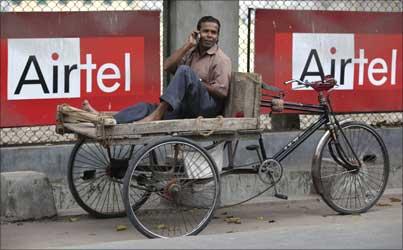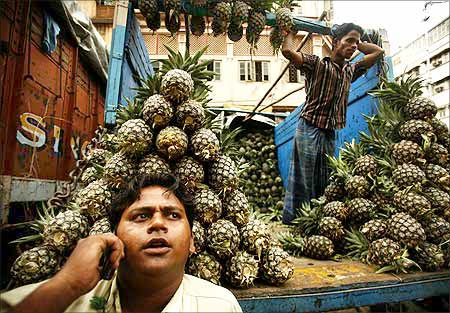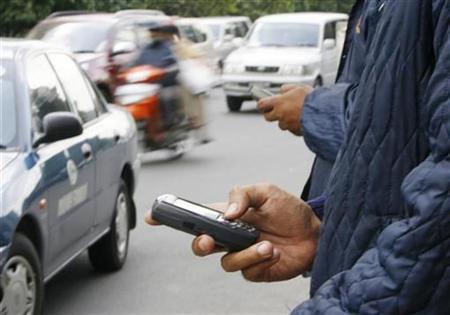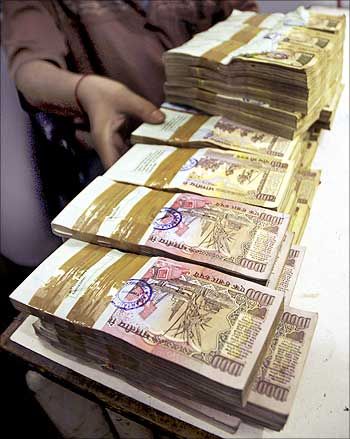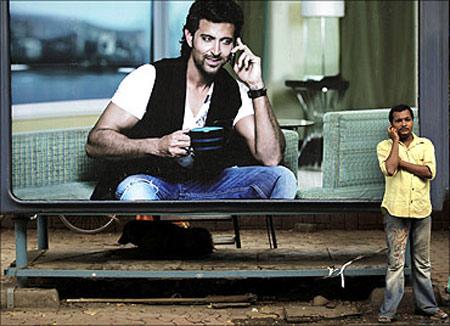 | « Back to article | Print this article |
Is the telecom sector's party over?
Telecom Minister Kapil Sibal has said there will be no roaming charges from next year. Subscribers can move from one circle to another (the country is divided into 22 telecom circles) without paying extra.
At the moment, about 10 per cent of the industry's annual revenue of Rs 1.35 lakh crore comes from roaming services. So, the top line of the mobile telephony operators could take a hit of up to Rs 13,500 crore.
But the Cellular Operators Association of India has said abolishing the roaming charge will lead to a rise in usage, and therefore the net impact will be less - somewhere around Rs 5,000 crore. But a hit it will nevertheless be.
To make sense of what is happening in telecom, you need to go back to some other recent news items.
Click NEXT to read more...
Is the telecom sector's party over?
One, the government has raised diesel prices by Rs 5 a litre. You will be surprised to know that telecom towers use as much as two billion litres of diesel every year to run their installations.
This is almost 3.5 per cent of the country's total diesel consumption (it is expected to rise to 3.5 billion litres by 2020). So, over the next one year, Rs 1,000 crore will be taken out of their profits.
They were unintended beneficiaries of the diesel subsidy, and now they need to pay more for the fuel.
Click NEXT to read more...
Is the telecom sector's party over?
Two, Reliance Communications has raised tariffs by a quarter, to Rs 1.50 per minute, in four circles (Madhya Pradesh, Himachal Pradesh, Bihar and Gujarat) and said the other 18 circles will follow in the next month as competitive intensity has tapered off and input costs have risen.
All eyes are now on Bharti Airtel, the market leader. Will it raise tariffs? I guess one will have to wait till Mukesh Ambani shows his hand.
There is an anticipation that he will soon enter the market, either through buying spectrum in the upcoming auction or acquiring an existing player.
What others do will depend on Mr Ambani's entry strategy.
Click NEXT to read more...
Is the telecom sector's party over?
Three, according to data released by the Telecom Regulatory Authority of India (Trai), the number of wireless subscribers in the country fell from 934.09 million in June to 913.49 million in July, a decline of 22.2 per cent.
However, the number of active subscribers (those who made at least one call in the last 60 days) went up marginally from 695.8 million in June to 698.06 million in July.
These are all pointers that the business model for mobile telephony is going through a paradigm shift.
Click NEXT to read more...
Is the telecom sector's party over?
The old way of running the business, after serving the industry well for almost 20 years, is giving way to newer realities: higher (market-determined and hence realistic) costs and lower profits.
The biggest difference is that spectrum, the airwaves where mobile services are hosted, is henceforth going to be expensive. Mind you, Trai, the regulator, has also recommended refarming of spectrum.
Incumbents who have efficient 900-MHz spectrum will have to surrender it and buy spectrum in the 1800 MHz frequency. This could mean more investments.
Click NEXT to read more...
Is the telecom sector's party over?
So far, the telecom ministry has been silent on this proposal. But you never know when it may decide otherwise.
So, cash needs to be conserved. The account books need to look healthy. On the other hand, expensive spectrum will mean lesser competition, which should give mobile companies elbow room to raise tariffs.
Inexpensive spectrum, sold to a clutch of new operators in 2008 by then telecom minister Andimuthu Raja has made India the most competitive telecom market in the world.
Click NEXT to read more...
Is the telecom sector's party over?
There are a dozen operators in each circle - much more than what India can accommodate. Newer operators have no other way to grab business but to offer lower and lower tariff plans.
Tariffs, as a result, have eroded as much as 40 per cent in the last three years - ever since the new operators started their services.
As a result, profitability has declined sharply. There was a slight correction in tariffs last year, but there is still a lot of lost ground that needs to be covered.
Click NEXT to read more...
Is the telecom sector's party over?
Once spectrum prices are determined by auction, there will be increased focus on how to improve usage - how to move up the average revenue per user, which has declined steadily in the last few years to around Rs 120 now.
This is where data and value-added services will play a crucial role.
Mobile companies are willing to let go of inactive subscribers because it doesn't help in any way in the new order.
Click NEXT to read more...
Is the telecom sector's party over?
In the past, the companies could ask for additional spectrum whenever they hit a certain number of subscribers.
Much energy was, therefore, spent on acquiring customers. This led to many operators offering connections at very low prices. So much so that it had become cheaper for customers to get a new connection than to buy talk time from their existing operator.
The stampede for customers had caused discounts to retailers (of mobile SIM cards and talk time) to spiral.
Click NEXT to read more...
Is the telecom sector's party over?
And dealers knew that higher profits could be made in selling connections, not in selling talk time.
Now, spectrum can only be bought in an auction. So, that madness to acquire customers has stopped.
Cutting out the inactive customers will raise the average revenue per user of mobile companies. This is important because all of them plan to go to the market - some to raise funds to buy spectrum, others to cut their debt.
The party is over. Serious business begins now.


